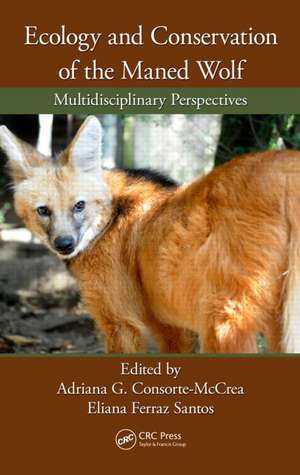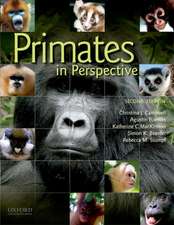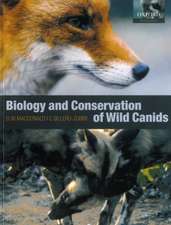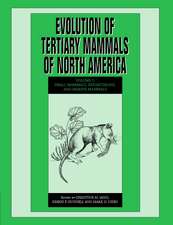Ecology and Conservation of the Maned Wolf: Multidisciplinary Perspectives
Editat de Adriana G. Consorte-McCrea, Eliana Ferraz Santosen Limba Engleză Hardback – 24 oct 2013
Ecology and Conservation of the Maned Wolf: Multidisciplinary Perspectives gathers the work of leading researchers from diverse disciplines and countries, covering up-to-date research on the biology, ecology, and conservation of the maned wolf. It presents innovative insights that can benefit conservation strategies and offers perspectives for the future of the species. The book is divided into three parts. Part I explains the general issues concerning the maned wolf: population viability, the relationship between maned wolves and people, and the management of captive maned wolves. It also reviews current aspects of species biology, including conservation genetics, feeding ecology, social structure and reproduction, and conservation medicine.
Part II contains case studies that present knowledge gathered from conservation programs and field research in all countries where the species is currently found—Brazil, Uruguay, Argentina, Bolivia, and Paraguay. Part III offers perspectives from diverse fields of research, exploring the challenges and opportunities connecting maned wolf conservation efforts with those of its habitat and of other endangered species. This includes education and communication tools, the application of human dimensions research to maned wolf conservation, ethnoconservation perspectives, and the ecological and socioeconomic challenges to the conservation of the cerrado habitat.
Preț: 599.49 lei
Preț vechi: 840.35 lei
-29% Nou
Puncte Express: 899
Preț estimativ în valută:
114.73€ • 119.33$ • 94.71£
114.73€ • 119.33$ • 94.71£
Carte tipărită la comandă
Livrare economică 12-26 aprilie
Preluare comenzi: 021 569.72.76
Specificații
ISBN-13: 9781466512597
ISBN-10: 1466512598
Pagini: 354
Ilustrații: 74 black & white illustrations, 40 black & white tables
Dimensiuni: 178 x 254 x 23 mm
Greutate: 0.58 kg
Ediția:New.
Editura: CRC Press
Colecția CRC Press
ISBN-10: 1466512598
Pagini: 354
Ilustrații: 74 black & white illustrations, 40 black & white tables
Dimensiuni: 178 x 254 x 23 mm
Greutate: 0.58 kg
Ediția:New.
Editura: CRC Press
Colecția CRC Press
Cuprins
Part I The Species and Ecology. Species Status. The Canidae Family: Setting the Scene for Maned Wolf Conservation. Maned Wolf Population Viability. Relationships between the Maned Wolf and People. The Maned Wolf Ex Situ Worldwide. . The Ex Situ Maned Wolf Population in Brazilian Zoos. Species Biology. Evolutionary and Conservation Genetics of the Maned Wolf. Feeding Ecology: A Review. Reproduction and Factors Affecting Reproductive Success in the Maned Wolf. Conservation Medicine. Part II Case Studies and Conservation Programs. Conservation of a Population of Maned Wolves, Chrysocyon brachyurus, on a Small Reserve in the Cerrado. A Case Study: Diet of Maned Wolf and Its Relationship to Seed Dispersal in a Cattle Ranch in Southeastern Brazil. Agricultural Expansion and Future of the Maned Wolf. The Maned Wolf Conservation Project: Serra Da Canastra, Minas Gerais, Brazil. Maned Wolf Conservation in the South of Brazil and Uruguay. Maned Wolf in Argentina. Environmental Influences on Maned Wolf Ecology in Bolivia. The Maned Wolf (Chrysocyon brachyurus) in Paraguay. Part III Perspectives for the Future. Education and Communication for the Conservation of Wild Canids. Introduction to the Human Dimension: A Valuable Research Tool to Achieve Wildlife Conservation Objectives and Maned Wolf Conservation. The Role of Ethnoscience in the Growth of Ethnoconservation as a New Approach to Nature Conservation in the Tropics: The Case of Brazil. Policy Intervention in the Cerrado Savannas of Brazil: Changes in Land Use and Effects on Conservation. Maned Wolf Biology and Conservation: The Road Ahead. Index.
Notă biografică
Adriana Consorte-McCrea, Ph.D., began her research career studying the captive breeding of maned wolves through an apprenticeship in São Paulo Zoo in 1986. She has contributed to environmental education programs for the education departments of Wildwood Trust, the Natural History Museum–Tring, and Zoological Society of London Whipsnade Zoo. Adriana currently lectures at Canterbury Christ Church University, Kent, UK, where she founded and chairs the interdisciplinary Wildlife and People Initiative (part of CCCU’s Ecology Research Group), promoting discussion and research about relationships between wildlife and society, in the context of biodiversity conservation. Her main interest areas are attitudes toward wild carnivores and maned wolf conservation. She is a member of the Reintroduction Specialist Group of the International Union for Conservation of Nature’s Species Survival Commission.
Eliana Ferraz Santos, Ph.D., is a native of Campinas (SP, Brazil), where she has worked for many years in biology and management of wild animals in Campinas Zoo. She has coordinated the Jequitibás Woods Zoo of Campinas since 2004, where she also serves as a zoologist. She has been the director of the "Associação Mata Ciliar" at the Canine Department of Jundiaí, and the founder and coordinator of the Project Echoes of the Woods (voluntary environmental education project) in Jequitibás Woods since 1997. Eliana has experience in zoology, working mainly in the areas of animal behavior, ecology of wild animals, captive animal management, and environmental enrichment. She has been an effective partner at the Paulista Society of Zoos since 1998, where she has directed the biology department since 2002.
Eliana Ferraz Santos, Ph.D., is a native of Campinas (SP, Brazil), where she has worked for many years in biology and management of wild animals in Campinas Zoo. She has coordinated the Jequitibás Woods Zoo of Campinas since 2004, where she also serves as a zoologist. She has been the director of the "Associação Mata Ciliar" at the Canine Department of Jundiaí, and the founder and coordinator of the Project Echoes of the Woods (voluntary environmental education project) in Jequitibás Woods since 1997. Eliana has experience in zoology, working mainly in the areas of animal behavior, ecology of wild animals, captive animal management, and environmental enrichment. She has been an effective partner at the Paulista Society of Zoos since 1998, where she has directed the biology department since 2002.
Descriere
In recent years, much effort has focused on the discussion of how to conserve large carnivores, such as wolves, while addressing public concerns. Gathering the work of leading researchers from diverse areas and countries, this book covers up-to-date research on the biology, ecology, and conservation of the maned wolf. It presents innovative insights that can benefit conservation strategies (in and ex situ health, feeding ecology, distribution, and people's attitudes) and offers diverse perspectives for the future of the species (education, human dimensions, ethnoconservation, and habitat studies).











